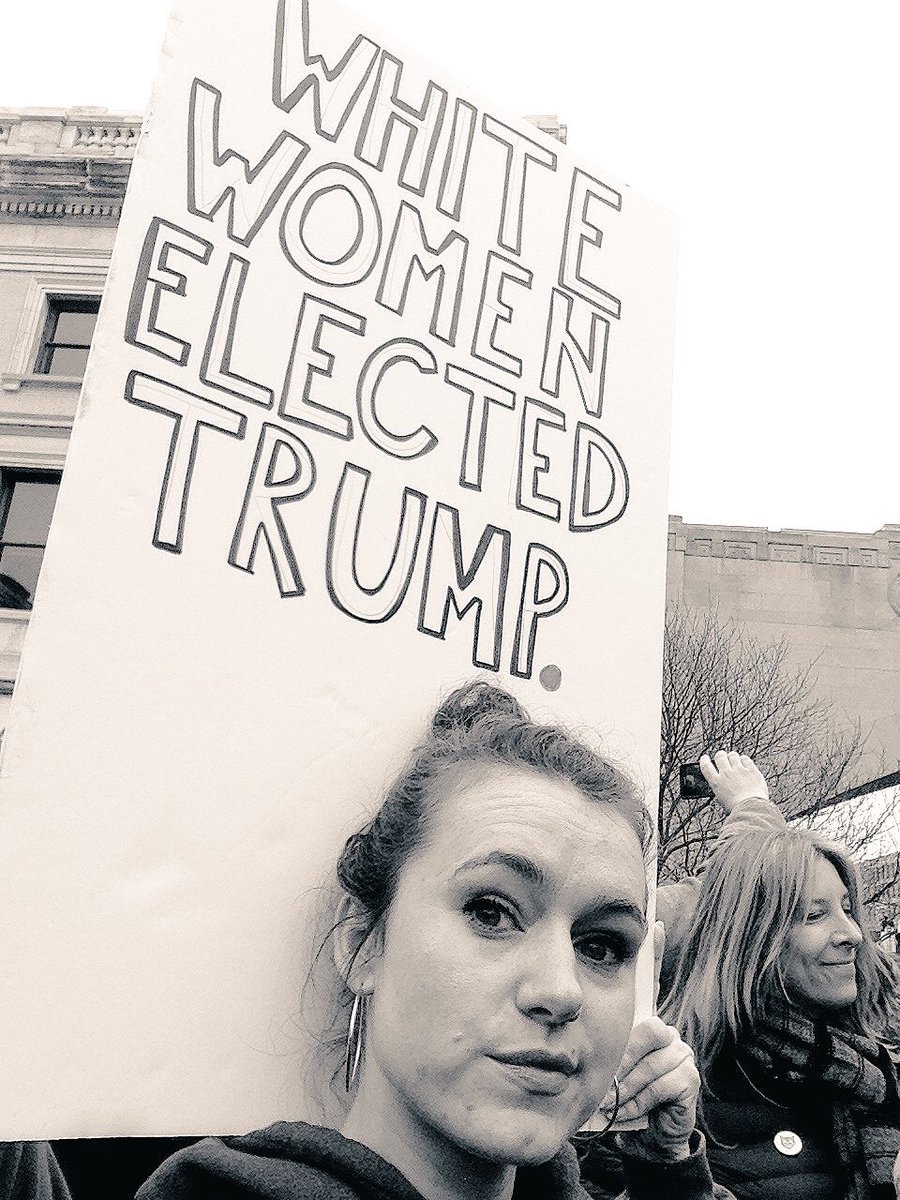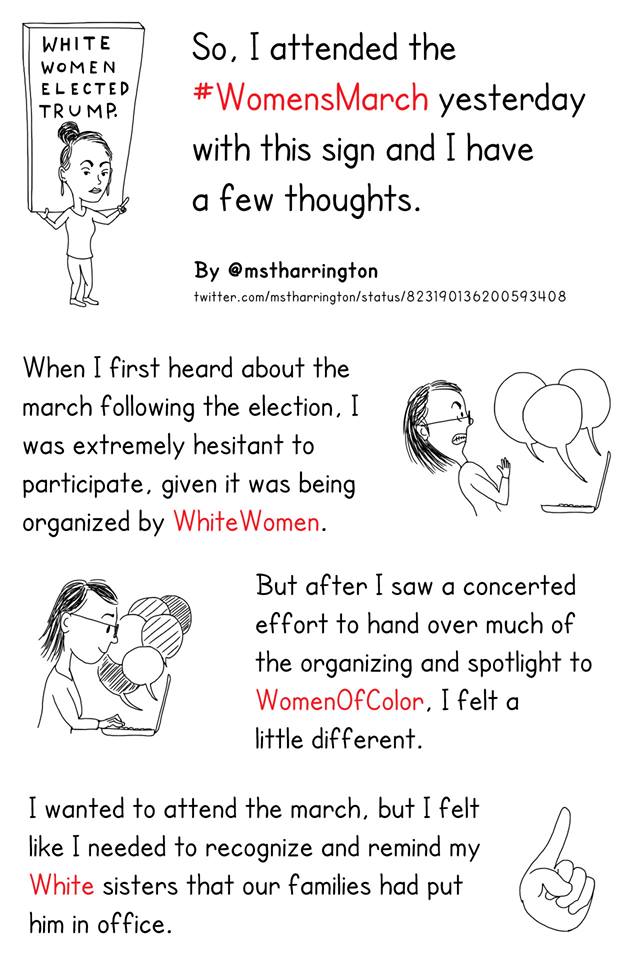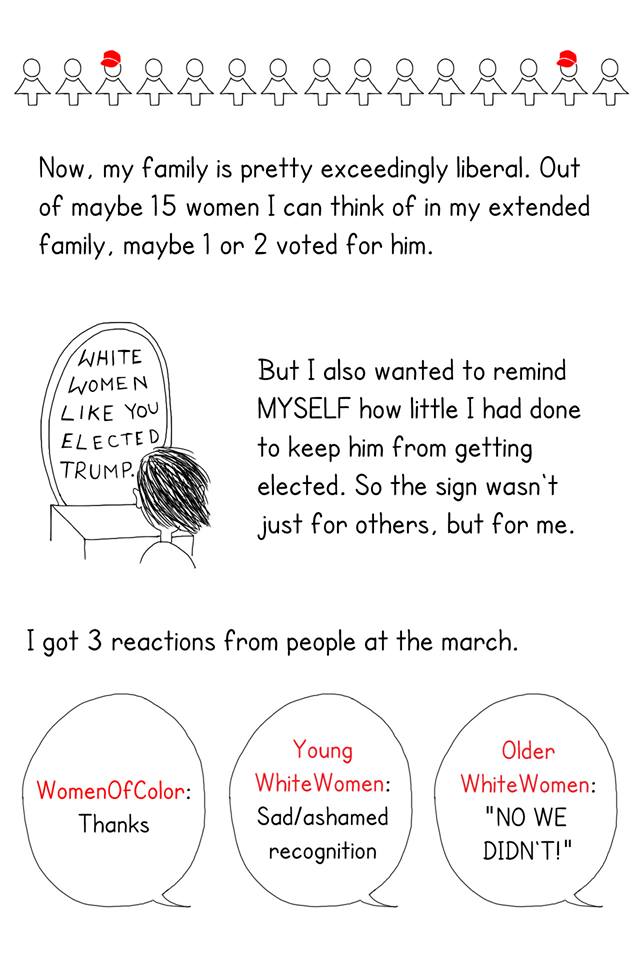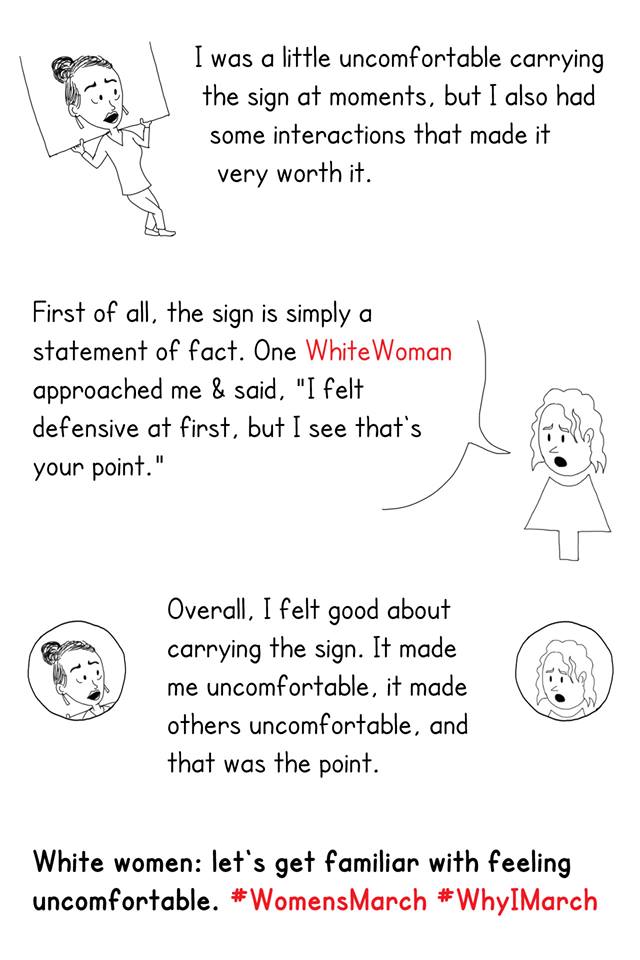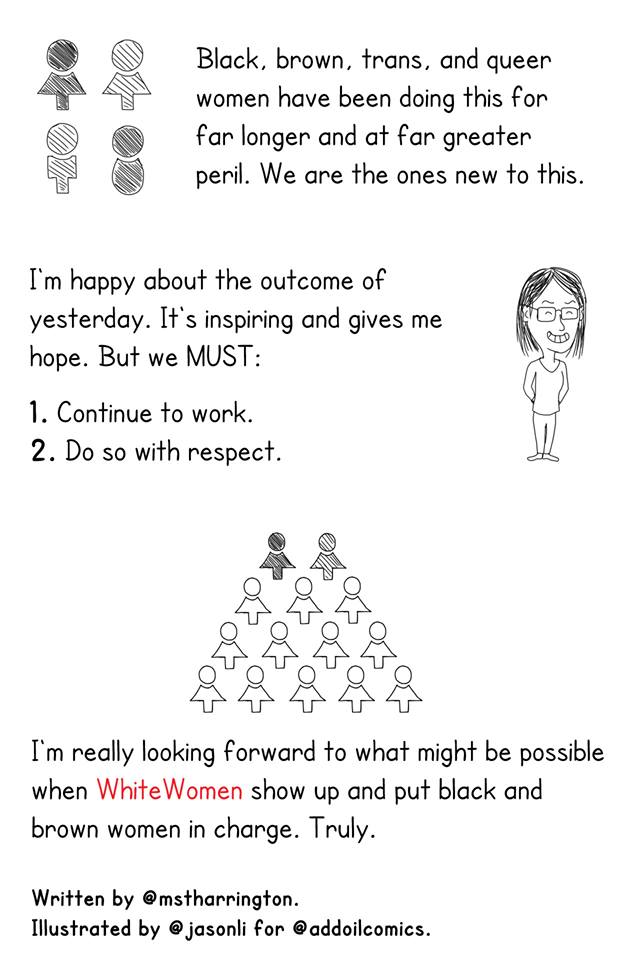Messofanego
Banned

https://twitter.com/WhatUpJT/status/822902415674380288
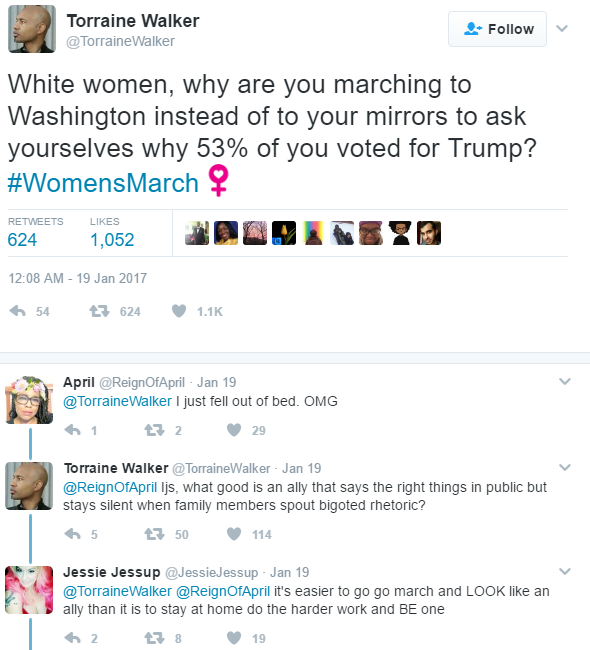
https://twitter.com/TorraineWalker/status/821992723204947968
UPDATE:
Angela Peoples, 30 year old co-director of LGBTQ org GetEqual, who made that sign had an interview with Brook Oble of The Root:
Woman in Viral Photo From Women's March to White Female Allies: ‘Listen to a Black Woman'
TR = The Root, AP = Angela Peoples
TR: Why did you decide to create the sign "White Women Voted for Trump"?
AP: We need to be really honest about why we're here. There was a sense for me of being at the march and in community with folks that were wanting to resist this horrifying reality, but also not wanting folks to get complacent.
TR: How did people respond to you and your sign?
AP: Most were saying, "Not this white woman," or "No one I know!" I'd say, "[Fifty-three percent] of white women voted for Trump. That means someone you know, someone who is in close community with you, voted for Trump. You need to organize your people." And some people said, "Oh, I'm so ashamed." Don't be ashamed; organize your people.
That's why the photo was such a great moment to capture, because it tells the story of white women in this moment wanting to just show up in a very superficial way and not wanting to do the hard work of making change, of challenging their own privilege. You're here protesting, but don't forget: The folks that you live with every single day—and probably some of the women that decided to come to the march—voted for Trump, made the decision to vote against self-interests to maintain their white supremacist way of life.
TR: You said you went to feel inspired. How did it feel, actually being there?
AP: It definitely felt very white. The other black women that I talked to there, and even women in other marches around the country, felt like they were alone, like more of the same was happening. I know that a lot of the organizers, particularly of the D.C. march, did a lot of work to make sure that the speakers were diverse, that the issue points reflected black folks' experiences; but there's also this reality that when we talk about feminism in this country, the faces have been white. Without an effort by white women especially to make sure those spaces are reflecting the diversity of women and femme people, we're not going to make the progress we need to.
TR: After this march, are you hopeful that white women will show up for black women and the issues of people of color?
AP: I definitely have hope. But I don't think it's a matter of white women becoming interested in our issues; I need them to recognize they are implicit or complicit benefactors of systems like white supremacy and patriarchy—and that's a problem.
Because issues of reproductive justice, wage issues, those are our issues, too. We don't need them to take on a new set of issues; we need them to understand the impact of these particular issues when it comes to race and gender and different experiences. They need to make adjustments to how they're organizing, what they're advocating for and how they show up to these systems based on that understanding.
TR: There were a lot of black women expressing on social media the hurt of seeing so many white women coming together for this march, but not showing up when we march. Do you have any words for those women?
AP: The only words I have are, "I love you and I see you." When black women expressed those feelings, I saw white women and gay men [saying it's divisive]—some of the same shit that people are saying to me about the poster. That also hurts because we're only being seen when we're coming together behind you. When we're speaking about our pain, when we're asking you to show up, then it's divisive, then it's somehow detrimental to the broader cause. That's simply not true.
But one thing I do know is, black women, we got us; we're continuing to organize our own communities, we're continuing to hold folks accountable across genders, across race. I would actually say to white women, if you want to be a part of a powerful movement that's going to get something done, you need to get behind and trust black women, trust black femmes, trust black trans women. Because we are making this way out of no way. If you're a white woman thinking, "What's next? Everything seems insurmountable," welcome to the fucking party. Listen to a black woman.
AP: We need to be really honest about why we're here. There was a sense for me of being at the march and in community with folks that were wanting to resist this horrifying reality, but also not wanting folks to get complacent.
TR: How did people respond to you and your sign?
AP: Most were saying, "Not this white woman," or "No one I know!" I'd say, "[Fifty-three percent] of white women voted for Trump. That means someone you know, someone who is in close community with you, voted for Trump. You need to organize your people." And some people said, "Oh, I'm so ashamed." Don't be ashamed; organize your people.
That's why the photo was such a great moment to capture, because it tells the story of white women in this moment wanting to just show up in a very superficial way and not wanting to do the hard work of making change, of challenging their own privilege. You're here protesting, but don't forget: The folks that you live with every single day—and probably some of the women that decided to come to the march—voted for Trump, made the decision to vote against self-interests to maintain their white supremacist way of life.
TR: You said you went to feel inspired. How did it feel, actually being there?
AP: It definitely felt very white. The other black women that I talked to there, and even women in other marches around the country, felt like they were alone, like more of the same was happening. I know that a lot of the organizers, particularly of the D.C. march, did a lot of work to make sure that the speakers were diverse, that the issue points reflected black folks' experiences; but there's also this reality that when we talk about feminism in this country, the faces have been white. Without an effort by white women especially to make sure those spaces are reflecting the diversity of women and femme people, we're not going to make the progress we need to.
TR: After this march, are you hopeful that white women will show up for black women and the issues of people of color?
AP: I definitely have hope. But I don't think it's a matter of white women becoming interested in our issues; I need them to recognize they are implicit or complicit benefactors of systems like white supremacy and patriarchy—and that's a problem.
Because issues of reproductive justice, wage issues, those are our issues, too. We don't need them to take on a new set of issues; we need them to understand the impact of these particular issues when it comes to race and gender and different experiences. They need to make adjustments to how they're organizing, what they're advocating for and how they show up to these systems based on that understanding.
TR: There were a lot of black women expressing on social media the hurt of seeing so many white women coming together for this march, but not showing up when we march. Do you have any words for those women?
AP: The only words I have are, "I love you and I see you." When black women expressed those feelings, I saw white women and gay men [saying it's divisive]—some of the same shit that people are saying to me about the poster. That also hurts because we're only being seen when we're coming together behind you. When we're speaking about our pain, when we're asking you to show up, then it's divisive, then it's somehow detrimental to the broader cause. That's simply not true.
But one thing I do know is, black women, we got us; we're continuing to organize our own communities, we're continuing to hold folks accountable across genders, across race. I would actually say to white women, if you want to be a part of a powerful movement that's going to get something done, you need to get behind and trust black women, trust black femmes, trust black trans women. Because we are making this way out of no way. If you're a white woman thinking, "What's next? Everything seems insurmountable," welcome to the fucking party. Listen to a black woman.
Suppose the white women who turned up to the Women's March aren't part of the majority of the white women (53%) who voted for Trump. There sure was quite some white fragility shown before the March where they didn't want to attend because they felt they were being singled out and attacked. So maybe the white women who voted for Clinton showed up. However, we do have to acknowledge the possible disparity of white women coming out to march in public but in private deciding differently when it came down to actually voting.
Vox: The women who helped Trump win - Tara Golshan
Nationally, Clinton picked up 54 percent of women voters compared with Trump's mere 42 percent. But Trump outperformed Clinton among white women, winning 53 percent of voters in that demographic. Drilling down further, he beat Clinton among white women without college degrees by 27 points. In the three states that decided the election — Wisconsin, Pennsylvania, and Michigan — that margin was enough to send Trump to the White House.
This is not to say that these Trump-supporting women weren't offended by Trump's comments or actions. Rather, it unravels the common illusion that women are a cohesive voting bloc. Women's politics are also shaped by other personal factors.
"There has long been a misconception that women voters vote by their gender identity instead of their party," Kelly Dittmar, a political science professor and scholar at Rutgers University's Center for Women in Politics, said. "To try to talk about women as a single voting bloc, but to neglect to look at the crosstabs, to neglect to look at the differences in race, age, education, creates this false shock."
...This is not to say that these Trump-supporting women weren't offended by Trump's comments or actions. Rather, it unravels the common illusion that women are a cohesive voting bloc. Women's politics are also shaped by other personal factors.
"There has long been a misconception that women voters vote by their gender identity instead of their party," Kelly Dittmar, a political science professor and scholar at Rutgers University's Center for Women in Politics, said. "To try to talk about women as a single voting bloc, but to neglect to look at the crosstabs, to neglect to look at the differences in race, age, education, creates this false shock."
Clinton's success with women is a statistic largely driven by her popularity among minorities. Among college-educated voters, more than 90 percent of black women voted for Hillary Clinton — 95 percent of black women voters without a college degree also voted for her, according to exit polls conducted by Edison Media Research and the Washington Post. She performed similarly with Hispanic women and nonwhite women.
Trump, on the other hand, found his strength among white women, whom he won by 53 percent overall. Break that number down even further, and Trump's success is specifically among white women without college degrees, 61 percent of whom voted for him. Clinton actually did 7 points better than Trump with white college-educated women.
Trump, on the other hand, found his strength among white women, whom he won by 53 percent overall. Break that number down even further, and Trump's success is specifically among white women without college degrees, 61 percent of whom voted for him. Clinton actually did 7 points better than Trump with white college-educated women.
When it came down to it, the main reasons people voted for were the economy and terrorism.

Trump got the white working class in his palm.
Women voted more for their political affiliation than their gender, and "their family status sways how they vote".
The white working class is already feeling the effects of broken promises by Trump to help them, such as in healthcare where they expected a replacement and not just a flat out repeal of ACA (only 26% of Americans support full repeal of ACA). Coal workers (and I'm sure plenty more groups) who voted for Trump are afraid of losing ACA/Obamacare.
Obamacare in Trump country: https://www.youtube.com/watch?v=M0FvLkXDKIs&feature=youtu.be
Democrats used to be the party of the white working class, but in the past several years, that hasn't come to fruition.
Guardian: Democrats once represented the working class. Not any more - Robert Reich
Democrats have occupied the White House for 16 of the last 24 years, and for four of those years had control of both houses of Congress. But in that time they failed to reverse the decline in working-class wages and economic security. Both Bill Clinton and Barack Obama ardently pushed for free trade agreements without providing millions of blue-collar workers who thereby lost their jobs means of getting new ones that paid at least as well.
They stood by as corporations hammered trade unions, the backbone of the white working class – failing to reform labor laws to impose meaningful penalties on companies that violate them, or help workers form unions with simple up-or-down votes. Partly as a result, union membership sank from 22% of all workers when Bill Clinton was elected president to less than 12% today, and the working class lost bargaining leverage to get a share of the economy's gains.
Bill Clinton and Obama also allowed antitrust enforcement to ossify – with the result that large corporations have grown far larger, and major industries more concentrated. The unsurprising result of this combination – more trade, declining unionization and more industry concentration – has been to shift political and economic power to big corporations and the wealthy, and to shaft the working class. This created an opening for Donald Trump's authoritarian demagoguery, and his presidency.
Now Americans have rebelled by supporting someone who wants to fortify America against foreigners as well as foreign-made goods. The power structure understandably fears that Trump's isolationism will stymie economic growth. But most Americans couldn't care less about growth because for years they have received few of its benefits, while suffering most of its burdens in the forms of lost jobs and lower wages.
You might say, well what about non-white working class? Non-white people already have longtime political affiliation with the Democratic party. They might be more informed about politics than white people, who don't have to worry as much when their rights and existence isn't in danger as frequently. They stood by as corporations hammered trade unions, the backbone of the white working class – failing to reform labor laws to impose meaningful penalties on companies that violate them, or help workers form unions with simple up-or-down votes. Partly as a result, union membership sank from 22% of all workers when Bill Clinton was elected president to less than 12% today, and the working class lost bargaining leverage to get a share of the economy's gains.
Bill Clinton and Obama also allowed antitrust enforcement to ossify – with the result that large corporations have grown far larger, and major industries more concentrated. The unsurprising result of this combination – more trade, declining unionization and more industry concentration – has been to shift political and economic power to big corporations and the wealthy, and to shaft the working class. This created an opening for Donald Trump's authoritarian demagoguery, and his presidency.
Now Americans have rebelled by supporting someone who wants to fortify America against foreigners as well as foreign-made goods. The power structure understandably fears that Trump's isolationism will stymie economic growth. But most Americans couldn't care less about growth because for years they have received few of its benefits, while suffering most of its burdens in the forms of lost jobs and lower wages.
Until we have a focus on improving conditions for the working class, of which many are white women who affect the vote, Trump will get re-elected in 4 years.
Hold on. The thing is, Clinton did have plans to help the working class!
The Atlantic: The Dangerous Myth That Hillary Clinton Ignored the Working Class - Derek Thompson
Hillary Clinton talked about the working class, middle class jobs, and the dignity of work constantly. And she still lost.
She detailed plans to help coal miners and steel workers. She had decades of ideas to help parents, particularly working moms, and their children. She had plans to help young men who were getting out of prison and old men who were getting into new careers. She talked about the dignity of manufacturing jobs, the promise of clean-energy jobs, and the Obama administration's record of creating private-sector jobs for a record-breaking number of consecutive months. She said the word "job" more in the Democratic National Convention speech than Trump did in the RNC acceptance speech; she mentioned the word "jobs" more during the first presidential debate than Trump did. She offered the most comprehensively progressive economic platform of any presidential candidate in history—one specifically tailored to an economy powered by an educated workforce.
What's more, the evidence that Clinton lost because of the nation's economic disenchantment is extremely mixed. Some economists found that Trump won in counties affected by trade with China. But among the 52 percent of voters who said economics was the most important issue in the election, Clinton beat Trump by double digits. In the vast majority of swing states, voters said they preferred Clinton on the economy. If the 2016 election had come down to economics exclusively, the working class—which, by any reasonable definition, includes the black, Hispanic, and Asian working classes, too—would have elected Hillary Clinton president.
She detailed plans to help coal miners and steel workers. She had decades of ideas to help parents, particularly working moms, and their children. She had plans to help young men who were getting out of prison and old men who were getting into new careers. She talked about the dignity of manufacturing jobs, the promise of clean-energy jobs, and the Obama administration's record of creating private-sector jobs for a record-breaking number of consecutive months. She said the word "job" more in the Democratic National Convention speech than Trump did in the RNC acceptance speech; she mentioned the word "jobs" more during the first presidential debate than Trump did. She offered the most comprehensively progressive economic platform of any presidential candidate in history—one specifically tailored to an economy powered by an educated workforce.
What's more, the evidence that Clinton lost because of the nation's economic disenchantment is extremely mixed. Some economists found that Trump won in counties affected by trade with China. But among the 52 percent of voters who said economics was the most important issue in the election, Clinton beat Trump by double digits. In the vast majority of swing states, voters said they preferred Clinton on the economy. If the 2016 election had come down to economics exclusively, the working class—which, by any reasonable definition, includes the black, Hispanic, and Asian working classes, too—would have elected Hillary Clinton president.
If the white working class wants a better future, they might have to be sold on pluralist social democracy that will HAVE to help non-white people too:
But any reasonable working-class platform requires the advancement of policies that may disproportionately help non-whites. For example, hundreds of thousands of black men stay out of the labor force after being released from prison sentences for non-violent crimes. For them and their families, criminal justice reform is essential economic reform, even if poor whites see it as a distraction from that "real" issues that bedevil the working class, like trade policy.
The long-term future of the U.S. involves rising diversity, rising inequality, and rising redistribution. The combination of these forces makes for an unstable and unpredictable system. Income stagnation and inequality encourage policies to redistribute wealth from a rich few to the anxious multitudes. But when that multitude includes minorities who are seen as benefiting disproportionately from those redistribution policies, the white majority can turn resentful. (This may be one reason why the most successful social democracies, as in Scandinavia, were initially almost all white.) Nobody has really figured out how to be an effective messenger for pluralist social democracy, except, perhaps, for one of the few American adults who is legally barred from running for the U.S. presidency in the future.
The Women's March is a momentous occasion but if issues are being decided by white women over minority women, there needs to be reflection and changes privately about what you vote for. Thankfully, there were Women's March events in the states (Pennsylvania, Wisconsin, Michigan) that helped decide Trump to win among white women. Maybe those women will change their vote and political affiliation after the event. People overwhelmingly say (even on GAF) not to discuss politics with your family, friends, or co-workers. I feel like that defeatist mentality plays a factor into voting attitudes not changing and maintaining the status quo especially in the red states. The long-term future of the U.S. involves rising diversity, rising inequality, and rising redistribution. The combination of these forces makes for an unstable and unpredictable system. Income stagnation and inequality encourage policies to redistribute wealth from a rich few to the anxious multitudes. But when that multitude includes minorities who are seen as benefiting disproportionately from those redistribution policies, the white majority can turn resentful. (This may be one reason why the most successful social democracies, as in Scandinavia, were initially almost all white.) Nobody has really figured out how to be an effective messenger for pluralist social democracy, except, perhaps, for one of the few American adults who is legally barred from running for the U.S. presidency in the future.
However, if white women and other white folk who come to the Women's March are enlightened and change their views privately afterwards, maybe Trump won't get re-elected in four years (if he doesn't get impeached before then).
Minorities can't do everything. White people have to be inclusive of them, if especially the working class wants a better future. White people have to do a lot of soul-searching and be able to take on criticism as a group rather than individually. They need to know the privileges afforded to them that aren't for other groups. They will have to be more politically informed. They will have to think on whether they do want a positive future that will also inevitably help non-white people.
UPDATE:
Indigenous women's experiences at the Women's March is quite revealing, and how talk of "unity" without thinking about race is exclusionary:
This deserves to be screencapped and seen by everyone. Made to look like a carnival act and making "jokes" of them.
https://twitter.com/sydnerain/status/823378710833270786
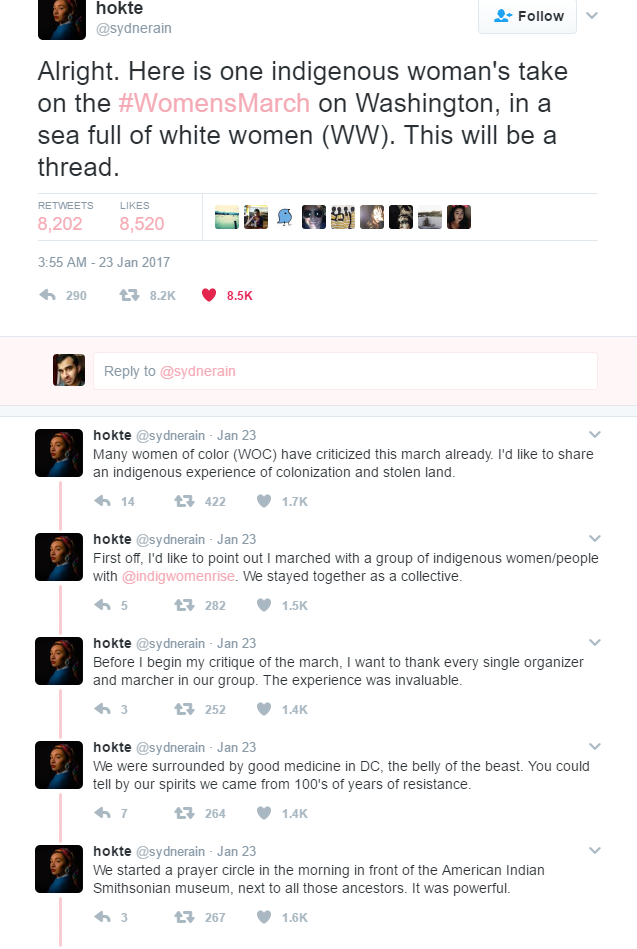
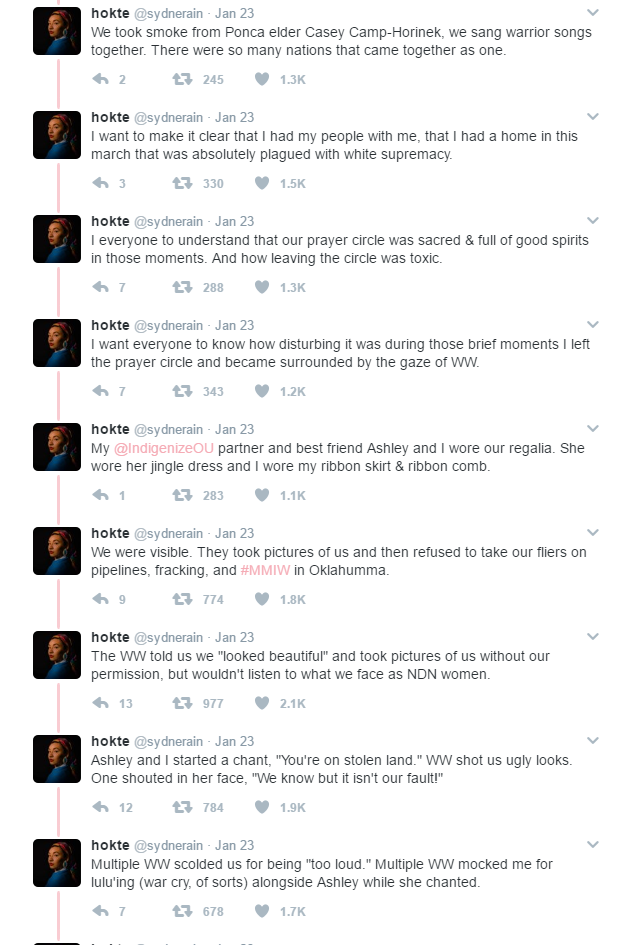
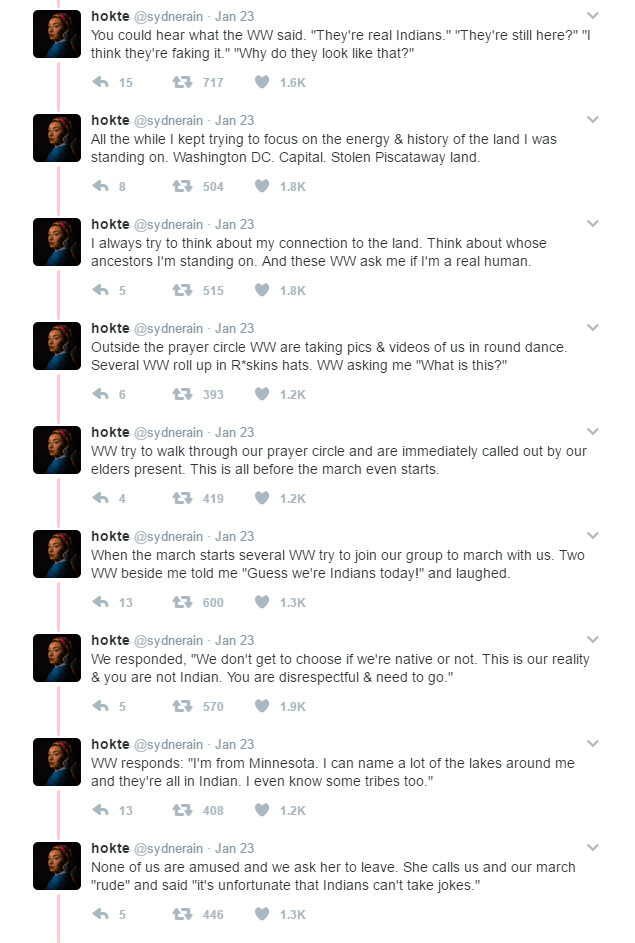
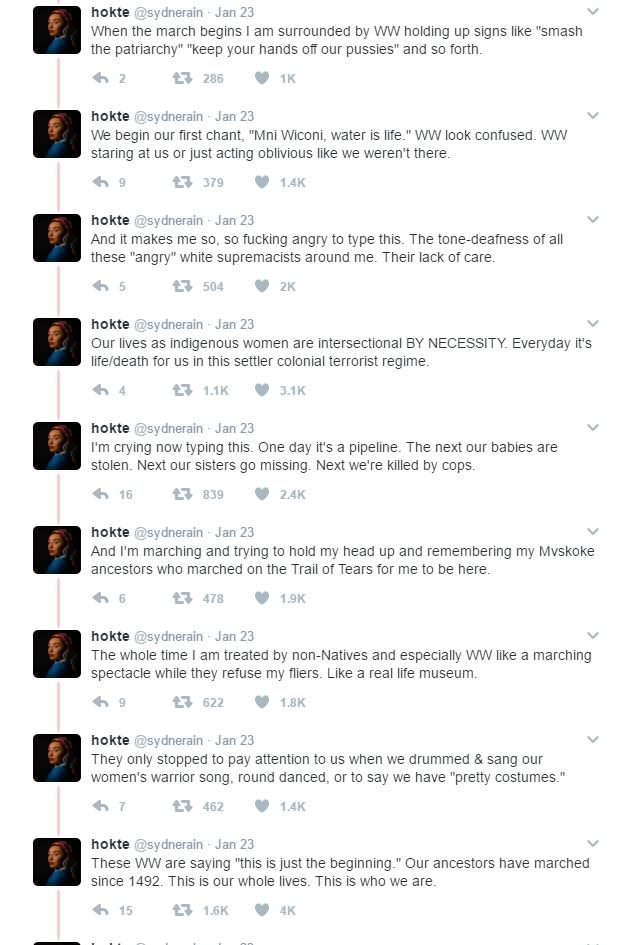
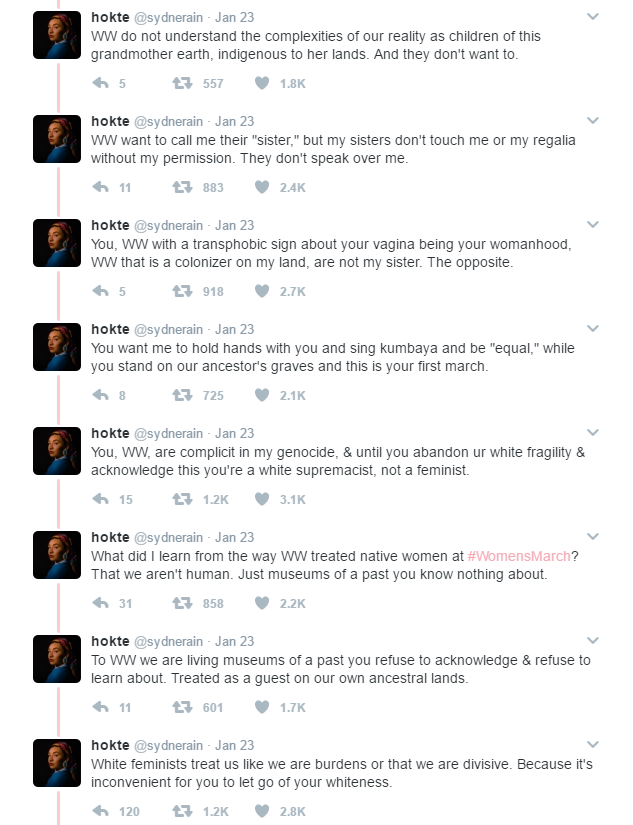
And this disgusting first reply below should tell you all you need to. That is a cautionary tale of what NOT TO DO. Actually all of this woman's replies are disgusting. Constantly telling women of colour to shut up and listen to white women and railing against intersectionality. No signs of letting up. The ironic thing is she links to a Vox piece about intersctional feminism, but doesn't seem to have taken heed of it. "It's harder to be a white woman in many ways than a WOC". "But black women need to look more to the example of white women IMO. Both can learn from each other!". "Whats divisive is literally DIVIDING up feminism along racial lines. Sorry, but time for WOC to suck it up & fall in line w/ the rest of us!"
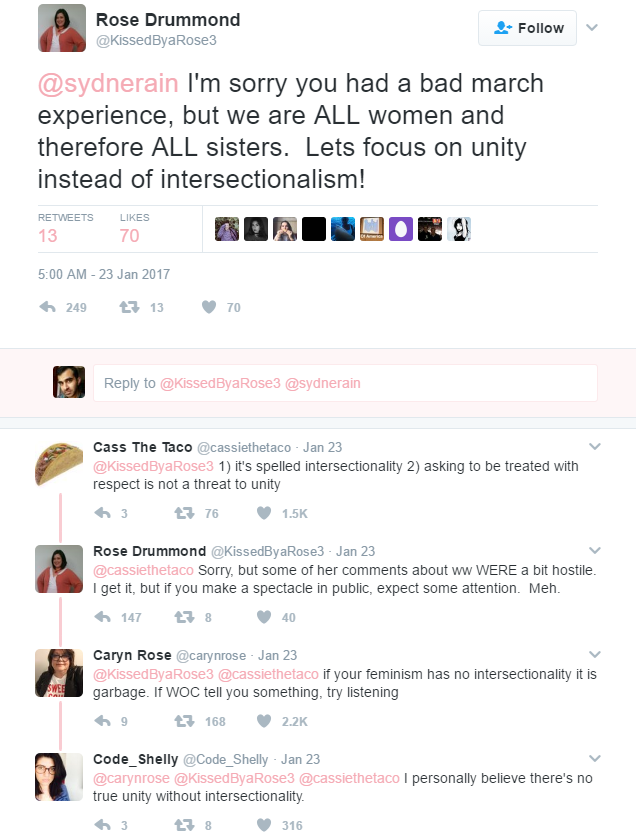
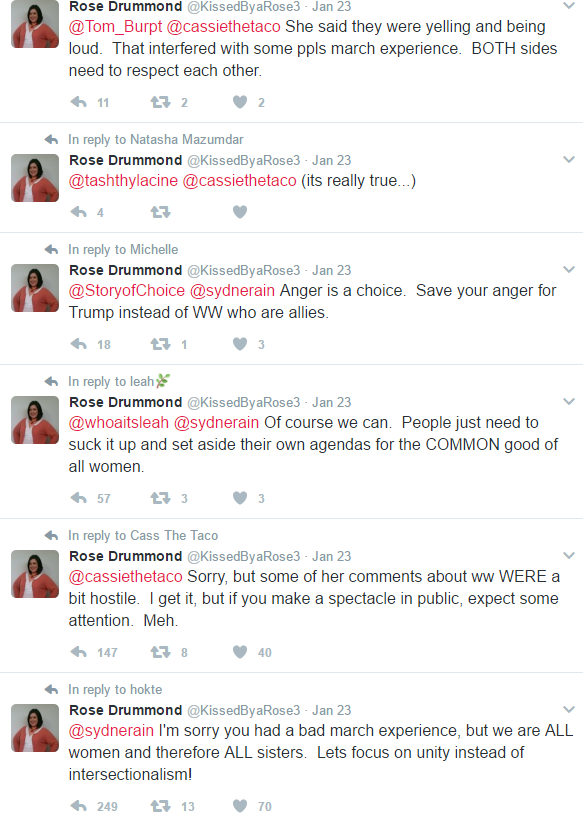
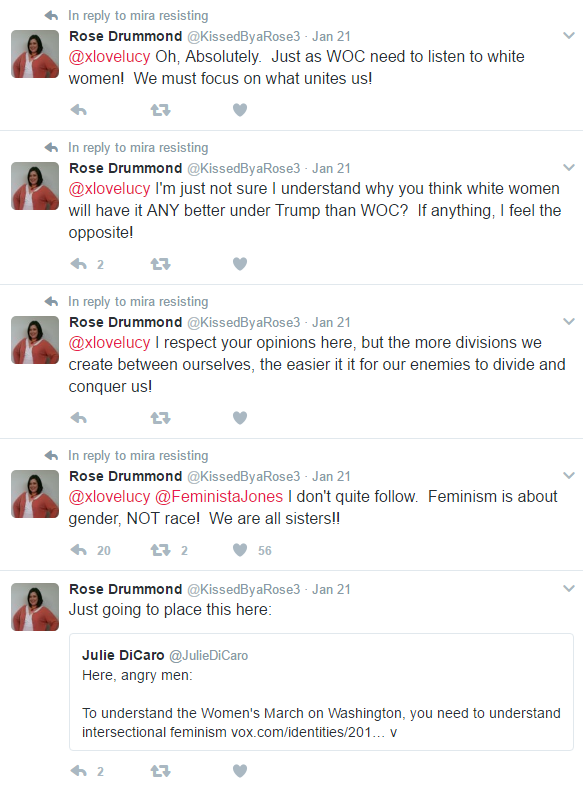
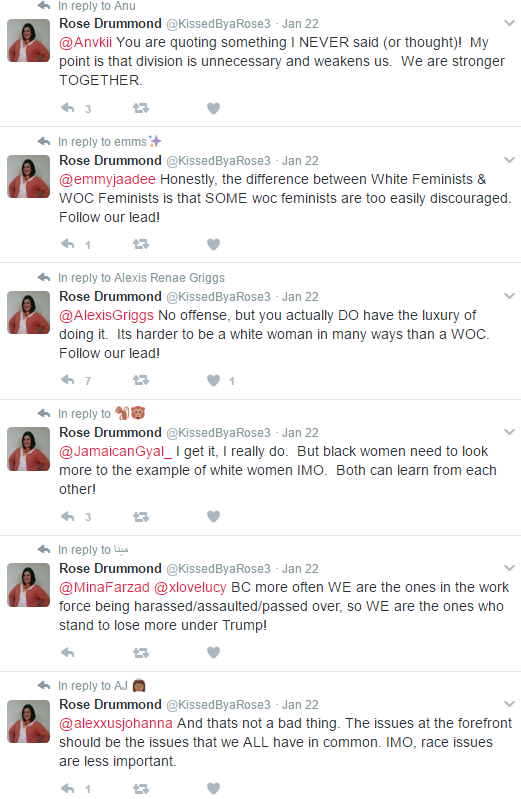
This is what people saying "unity" in these discussions sounds like, when they want to ignore race.
A couple more threads of indigenous women's experiences at Women's March:
https://twitter.com/debreese/status/823490997074137088
https://twitter.com/Alhakofi/status/822922703753637888
A white woman's experience carrying a "White Women Elected Trump" sign:
How about we listen to some actual women instead of all these dudes in here trying to defend the honor of white women?
https://www.facebook.com/AddOilComics/posts/1848172338736986
https://twitter.com/mstharrington/status/823190136200593408
